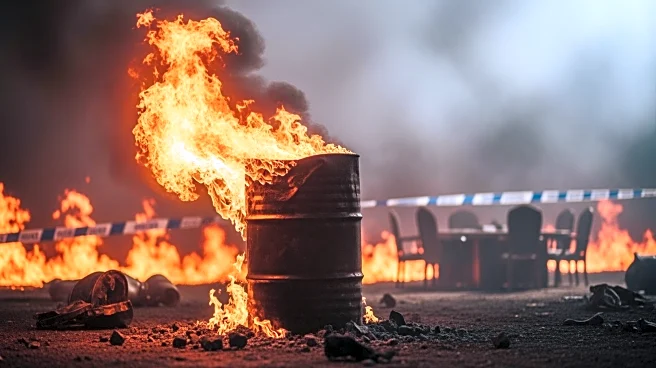What's Happening?
Ukraine's armed forces have conducted a drone attack on the oil terminal at the Russian Black Sea port of Tuapse. The strike damaged the loading facility and two ships docked at the pier. Video footage captured the sound of piston-engined drones, indicating
a long-range aerial UAV strike. This type of attack has been used by Ukraine to target Russian oil and gas infrastructure. Imagery from the harbor showed fires burning on the pier and vessels, with NASA FIRMS data confirming a large infrared signature visible from space. The attack continued after several hits, with tracer fire from air defense efforts observed. The Rosneft terminal at Tuapse, capable of handling 50 million barrels per year, suffered a substantial oil spill, as reported by locals in Gizel-Dere. The vessels affected included the Greek-owned Aframax Pollux and product tanker Coast Buster, along with the Turkish-owned product tanker Chai.
Why It's Important?
The attack on the Tuapse oil terminal highlights the ongoing conflict between Ukraine and Russia, with significant implications for global oil markets. Damage to the terminal could disrupt oil shipments, affecting supply chains and potentially leading to increased insurance premiums for companies operating in the region. This may discourage shipping activities at Russian ports, impacting the local economy and international trade. The strike underscores Ukraine's strategic use of drone technology to target critical infrastructure, demonstrating its capability to inflict economic damage on Russia. The incident may escalate tensions further, influencing geopolitical relations and energy security in the region.
What's Next?
The attack may prompt increased security measures at Russian ports and oil facilities, as well as potential retaliatory actions by Russia. Companies involved in shipping and oil transport may reassess their operations in the Black Sea region, considering the risks of further attacks. The international community may respond with diplomatic efforts to de-escalate tensions and address the security of energy infrastructure. Monitoring of the situation will be crucial to anticipate further developments and their impact on global energy markets.
Beyond the Headlines
The use of drones in warfare raises ethical and legal questions about the conduct of military operations and the protection of civilian infrastructure. The attack on Tuapse may lead to discussions on international regulations governing drone warfare and the protection of critical infrastructure. Long-term, the conflict could drive advancements in drone technology and defense systems, influencing military strategies worldwide.















